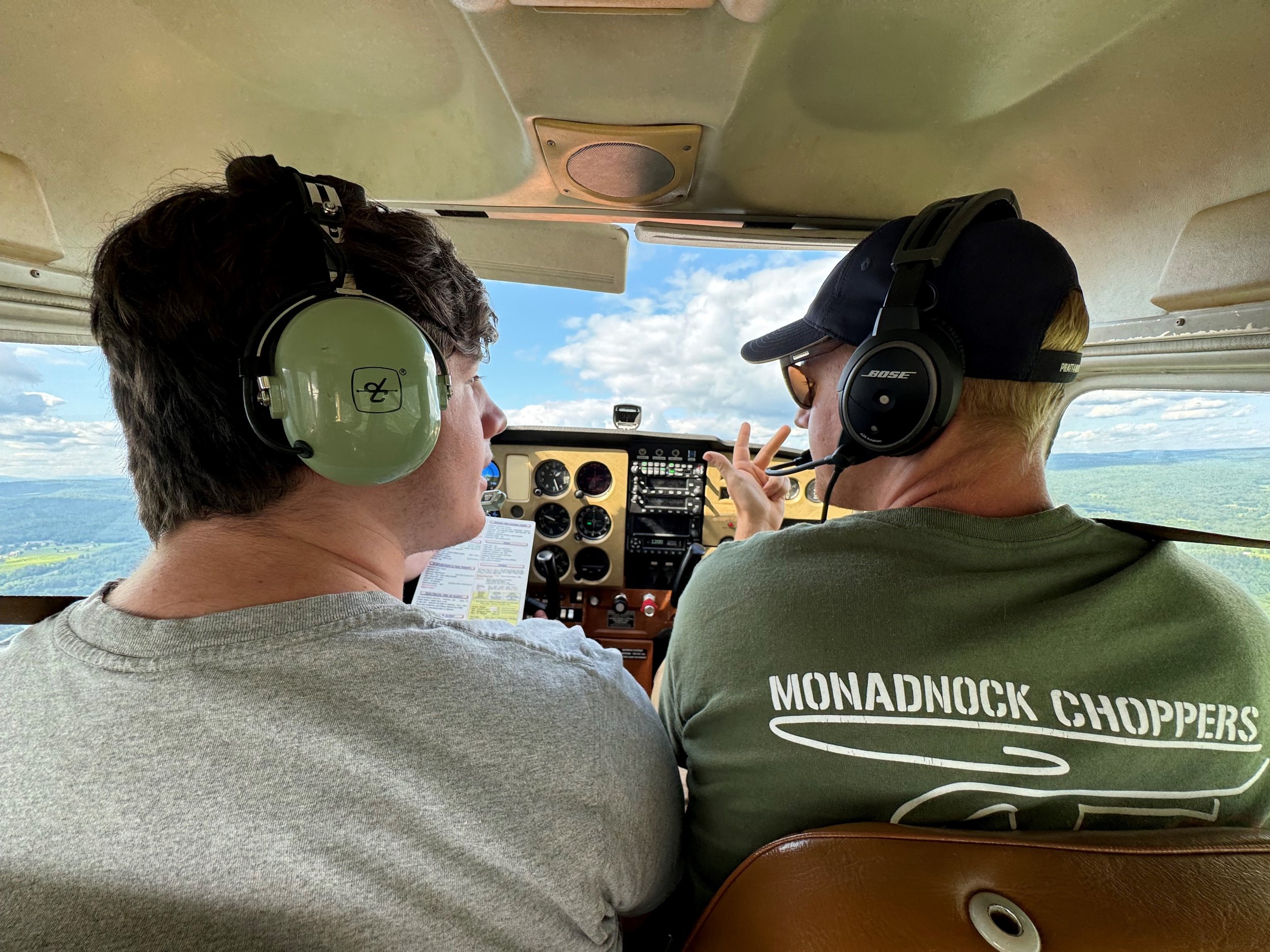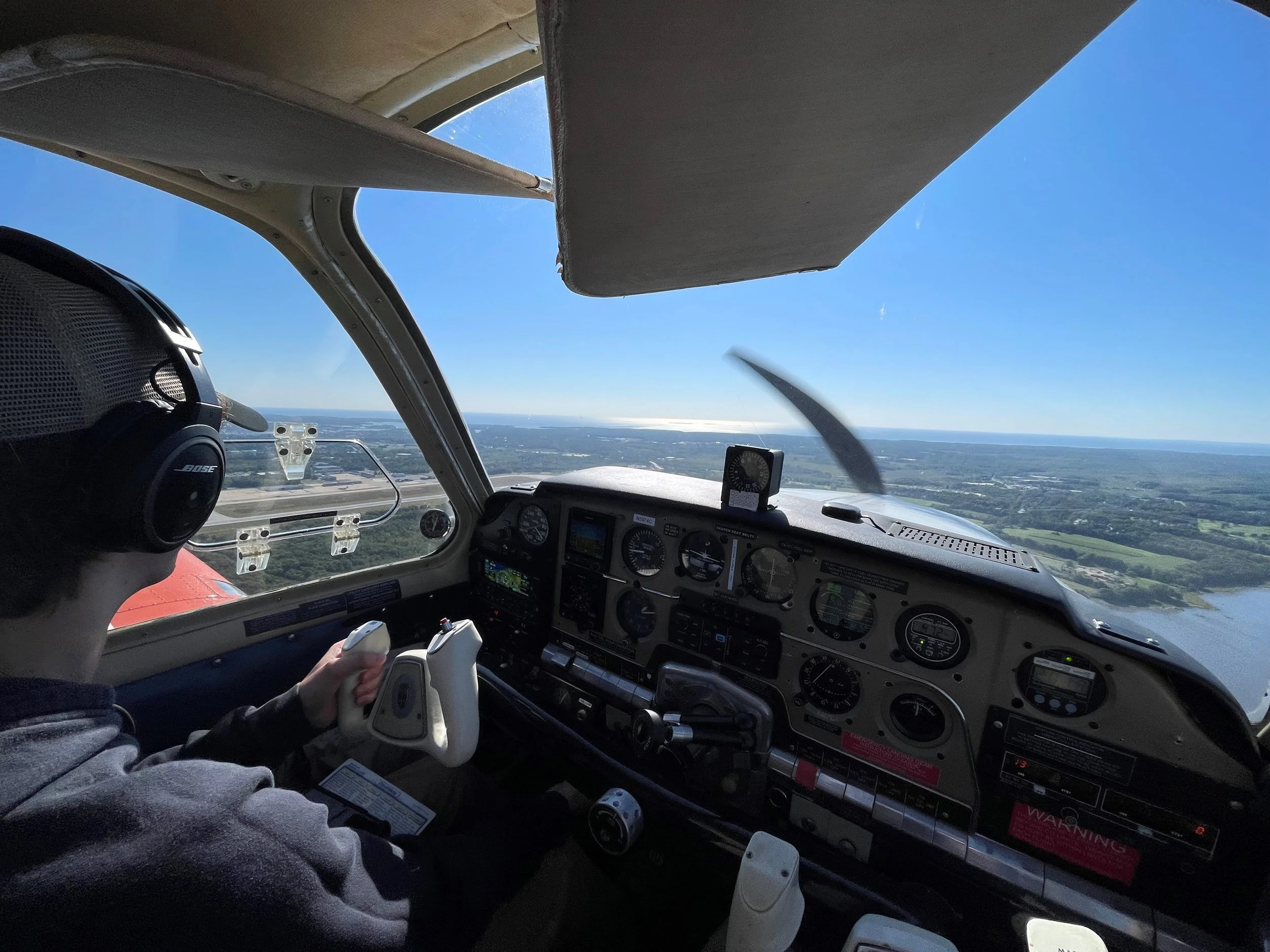airplane Flight Training
why become a pilot?
Becoming a pilot not only opens the door to the world of personal aviation and exciting careers, but also helps develop life skills that can benefit you in many areas. The training and responsibility involved in flying an aircraft builds critical thinking, decision-making, and problem-solving abilities. Pilots learn to stay calm under pressure, making quick and effective decisions even in challenging situations—a skill that translates well to both personal and professional life. Flying also teaches discipline and time management.
In essence, the skills learned in aviation—problem-solving, communication, discipline, adaptability, and leadership—make becoming a pilot not only a professional achievement but also a personal growth journey.
Your Aviation Journey with Monadnock Choppers
At Monadnock Choppers, we offer flight training as a FAA Part 61 flight instruction program in fixed-wing and rotorcraft operations. This page is focused on our fixed-wing flight training. We also offer several advanced courses for Tailwheel and High Performance/Complex endorsements' for aviators looking to continue to challenge themselves and grow their skills. If you are unsure or have questions about how start, contact our general email and we will set-up a phone call or discovery flight with one of our instructors.

What You Will Learn
Our flight training program
Our training program is designed to provide you with the skills, knowledge, and confidence to excel in aviation, whether you’re pursuing a private pilot license or advancing to a commercial career. With a blend of comprehensive ground instruction and hands-on flight experience, we tailor each course to meet your individual needs and goals. Our program focuses on real-world decision-making, critical thinking, and effective communication, ensuring that you’re prepared to handle any scenario confidently. Whether you're flying solo for the first time or refining advanced techniques, we provide the support and guidance you need.
-

Personalized Instruction
Personalized instruction is at the core of our flight training program, ensuring that each student receives tailored guidance based on their unique learning style, pace, and goals. We understand that every pilot comes with different experiences and needs, so our certified instructors work closely with you to create a training plan that meets those needs. Whether you’re mastering the basics or tackling advanced maneuvers, personalized instruction ensures that you get the attention, feedback, and support necessary to succeed in your aviation journey.
-

Flexible Scheduling
One of the advantages of a Part 61 program is the scheduling flexibility. Our flight training program offers flexible scheduling designed to fit seamlessly into your busy lifestyle. We understand that balancing work, school, and personal commitments can be challenging, which is why we provide the freedom to choose training times that suit you best. Whether you prefer morning flights, weekend lessons, or evening sessions, our goal is to make your training as convenient and stress-free as possible.
-

Upgraded Fleet
Our varied fleet of aircraft offers a diverse and dynamic training experience for pilots at every level. This variety not only enhances your learning by familiarizing you with different types of aircraft, but also prepares you for a broader range of real-world flying conditions and scenarios. Many of our aircraft offer modern safety features, avionics, and autopilots. Our tailwheel training enhances your stick and rudder skills and our high performance/complex training meets the commercial training requirement. Safety is our top priority and each aircraft is carefully maintained.
-

Diverse Training Environment
At the heart of our training is the Keene Airport, which offers an excellent training and safe environment for pilots and access to a variety of operational conditions. We provide close access to both towered and untowered airports, giving you the opportunity to practice in airspaces with varying levels of activity. You will gain hands-on experience on traditional paved runways, as well as more challenging environments such as grass runways, short fields, and even ice runways during the winter months.
Licenses and Endorsements
Below, you can explore the various pilot licenses and endorsements available at our flight school. Each program is designed to meet specific flying objectives, from private pilot licenses that allow you to fly recreationally with friends and family, to commercial licenses which open the doors to a career in aviation. We also offer specialized endorsements and ratings that enhance your flying abilities, such as instrument ratings or high performance/complex endorsements, which can further bolster your pilot credentials. For those interested in deepening their understanding, we recommend reviewing the FAA's official pilot training materials and resources, which provide comprehensive insights into each license's requirements and benefits
-
This course is for students who wish to learn to fly for recreational or personal purposes. A private pilot certificate allows the pilot to fly with or without passengers but it cannot be used to fly for hire. This certificate is also the first step in becoming a professional pilot. A written exam, a practical exam, and FAA medical is required to earn this certificate.
Our program provides aspiring pilots with the fundamental knowledge and flight training required to earn their private pilot license. Students learn from experienced instructors and gain hands-on experience in a variety of aircraft, preparing them for safe and confident solo flight operations.
Completion time of the course may vary depending on training requirements and ability. The cost of the Private Pilot course can vary significantly based on the student's aptitude.
-
Description text An instrument rating is a great addition to a private pilot or commercial pilot certificate and will increase your skill base through precision instrument flying. The instrument rating allows you to fly under Instrument Flight Rules (IFR). A written exam and a practical exam is required to earn this certificate.
Our instrument rating program enables pilots to develop the skills necessary to fly in adverse weather conditions and navigate using instrument flight rules (IFR). Through ground instruction and flight training, students learn to interpret flight instruments, execute precision approaches, and conduct instrument flight procedures with precision and confidence.
If your goal is to be a career pilot, an instrument rating is a must for most employers. An instrument rating is also a valuable safety rating to have and can lower insurance costs for some pilots.
-
Designed for individuals aspiring to pursue a career in commercial aviation, our commercial pilot program offers comprehensive training in advanced flight maneuvers, navigation techniques, and aircraft systems. With a focus on proficiency and professionalism, students graduate prepared to take on the challenges of commercial flying. This certificate is an important step in your aviation career and allows pilots to operate an aircraft commercially for compensation or hire.
In the commercial pilot course, students will expand the knowledge and skills learned in the private pilot course. A written exam and a practical exam is required for this course.
-
For pilots seeking to share their passion for aviation and train the next generation of aviators, our Flight Instructor Rating program provides the necessary training to become a certified flight instructor. Students gain expertise in instructional techniques, flight training methodologies, and student evaluation, preparing them to inspire and mentor future pilots.
Many people looking to pursue a professional career in aviation use a CFI rating to build the time and experience required for flying more advanced aircraft.



